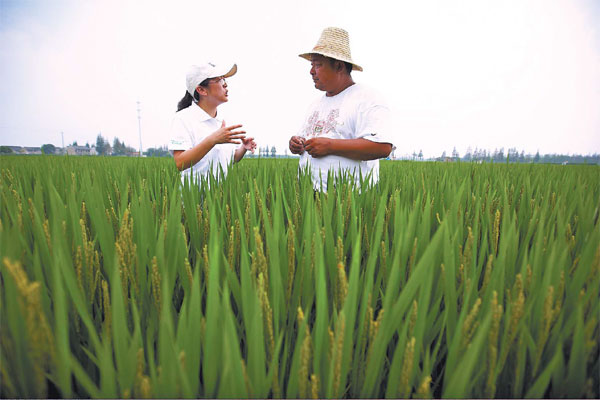China's agriculture sector going for bigger harvest
Updated: 2015-05-29 08:23
By Zhong Nan(China Daily Europe)
|
|||||||||||
Food production system faces demands for quality and quantity
China has long controlled its staple grain import quota to ensure food security. But the nation's agriculture sector is welcoming high-end farming products from Europe.
Syngenta AG, the largest European producer of hybrid seeds and crop protection products, is just one of the foreign companies contributing to China's agricultural development.
|
The central government is investing more in biotechnology and working with foreign companies to boost farm production. Photos provided to China Daily |
Christoph Maeder, member of the executive board of Syngenta AG, says: "We are ... developing new technology which should enable farmers, together with the right agronomic knowledge, to really improve the farmers' productivity, and thereby also producing more sustainable farming methods."
China's food security needs an integrated and comprehensive approach that includes international cooperation, infrastructure investment and education, as well as science and technology, Maeder says. He was speaking at the Swiss pavilion at Milan Expo 2015, which has food security and renewable energy as its themes.
Syngenta will exhibit in the Swiss pavilion from May 1 to June 12 during the expo. The company wants to highlight the challenges of food security and showcase the importance of innovation and partnership in the development of sustainable agriculture solutions at the expo.
China has the world's largest agricultural output, but it faces a severe shortage of arable land caused by urbanization, industrialization and climate change, according to a study by the China National Grain and Oils Information Center in March.
In addition to coping with environmental issues, China also has to feed a growing and increasingly wealthy population that wants better and more nutritious food.
China will need to feed 1.45 billion people amid a drive for more sustainable economic growth that focuses on quality over quantity and emphasizes environmental stewardship and equity.
"From a long-term perspective, we believe that innovation, technology and collaboration will be the pillars of ongoing growth. Syngenta is willing to work with both the Chinese government and farmers to supply the quality tools needed to meet the demand of food security," says Maeder.
Last year, the Swiss company invested $52.4 million (46 million euros) to build a factory in East China's Jiangsu province, producing more than 134 types of agrochemicals. It became operational in March.

The company also received a safety certificate from the Chinese Ministry of Agriculture for its Viptera corn, known as MIR 162, in December.
Syngenta has employed more than 2,000 in China since it started business in the country in 1998. It has invested $360 million in China since 2000 to compete with established rivals from the United States and Germany.
The company's global sales in 2014 reached $15.1 billion through the work of 28,000 people in more than 90 countries and regions.
Although China has a fragmented agricultural structure, with farm sizes smaller than those in developed nations, there is potential for growth says Maeder.
"Collaborating with international companies not only can accelerate the development and introduction of bio-technology, but also reduce vulnerability to pests, increase grain supplies and cut down food price inflation," says Tian Zhihong, a professor of food security and grain trade at Beijing's China Agricultural University.
To minimize the risk as much as possible, the central government has increased its investment in the development of agricultural biotechnology as well as offering subsidies for major grain-producing areas and farming cooperatives.
To prevent supply shortages of certain crops, China in 2014 also approved the import of another two varieties of biotech soybeans developed by DuPont Pioneer, from the US, and Germany's Bayer CropScience AG.
With China and other parts of the world facing problems brought on by exhausted farmland, limited water resources and old farming methods, Syngenta launched the Good Growth Plan in 2013, with six measurable targets to help address the challenges of global food security and sustainable development.
The measures include increasing farm productivity while boosting resource efficiency, rejuvenating ecosystems and strengthening rural communities.
"We believe that businesses can play a greater role in helping growers farm more sustainably. Syngenta China made a significant contribution in empowering small holders and safe use training last year," says Pierre Cohadon, president of Syngenta China.
Under the plan, a total of 34 reference farms and 209 benchmark farms were established, covering corn, rice and potatoes in 2014. It also trained 350,000 people in safety programs, including 179,000 small-holder farmers last year.
Cohadon says this is only the beginning of the journey to 2020, the plan's deadline. Partnerships with a range of stakeholders are required to achieve these commitments and bring greater benefits to the farmers, the environment and rural communities.
"The close alignment between our Good Growth Plan and the direction of China's agriculture modernization reflected in the No 1 Document will enable us to better support sustainable agricultural development in China," Cohadon says.
The annual No 1 Central Document targets agriculture and rural issues, such as optimizing grain production and safeguarding farmers' income.
Ding Lixin, a researcher at the Chinese Academy of Agricultural Sciences in Beijing, says just as the Chinese government wants to make good use of both domestic and foreign resources, so the participation of international companies will also encourage domestic companies to be more innovative.
"When local companies become bigger and more competitive, that will help the government to feel more comfortable and eventually modify the policy, and therefore allow foreign companies to increase their investments, patent technologies, talents and new jobs in China," says Ding.
In China, foreign companies are allowed to hold up to 49 percent of shares in a joint venture in crop seed businesses such as corn, wheat and rice.
Ding says they are still limited by local regulations, which is why these big names are willing to assist Chinese seed and agrochemical companies to grow bigger and more professional.
zhongnan@chinadaily.com.cn
(China Daily European Weekly 05/29/2015 page20)
Today's Top News
British Queen makes references to China in keynote speech
Bayern cashes in on Chinese fans' frenzy for European soccer
German rail giant mulls buying trains from China
Blair to resign as Middle East Quartet envoy
London stock exchange takes steps to include China A shares
China calls for durable settlement of Kosovo issue
China urges BRICS to unite for promoting multi-lateralism
New way to enjoy movie in Berlin
Hot Topics
Lunar probe , China growth forecasts, Emission rules get tougher, China seen through 'colored lens', International board,
Editor's Picks

|

|

|

|

|

|







